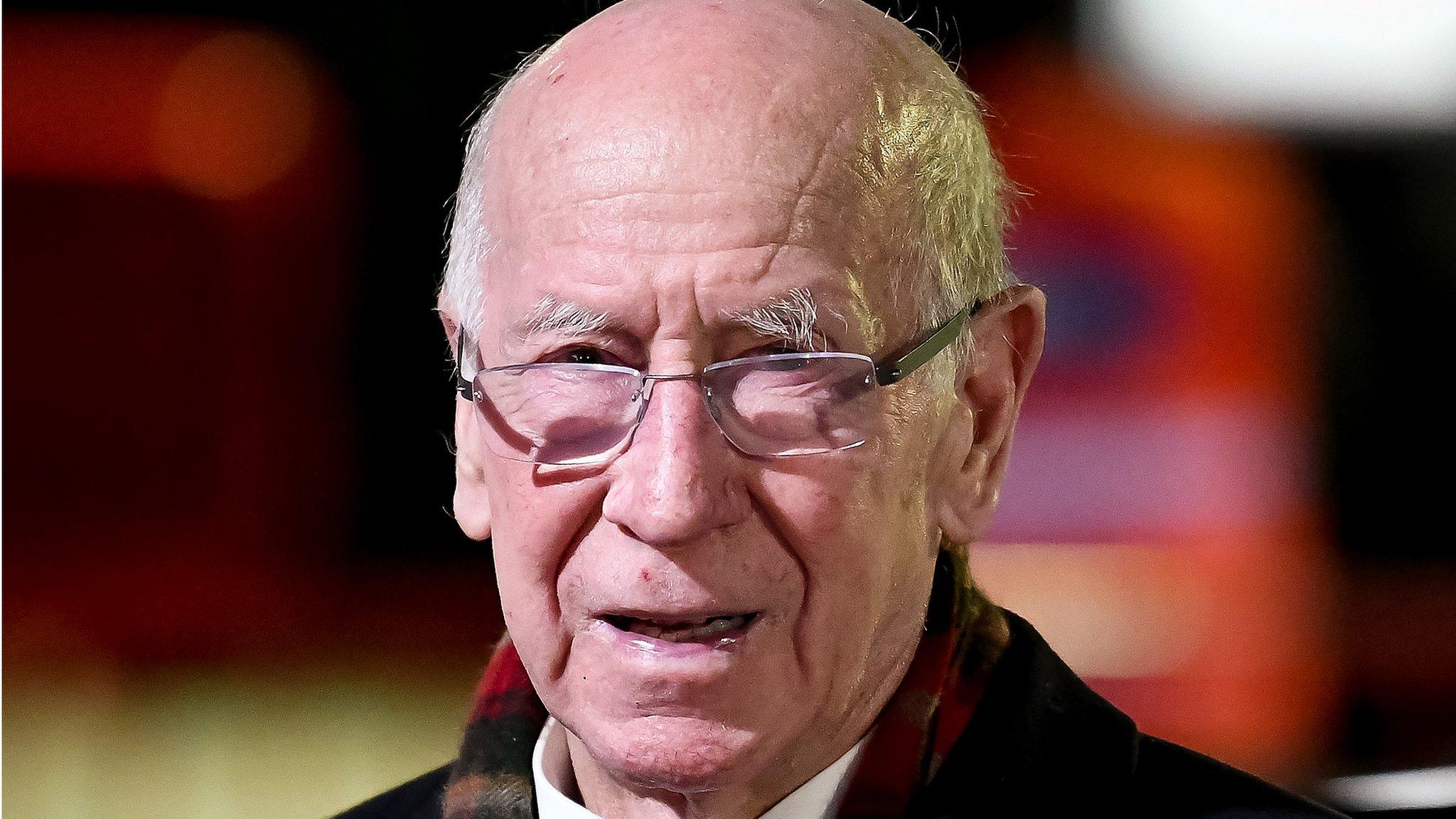Dementia and the power of sporting memories
- Published
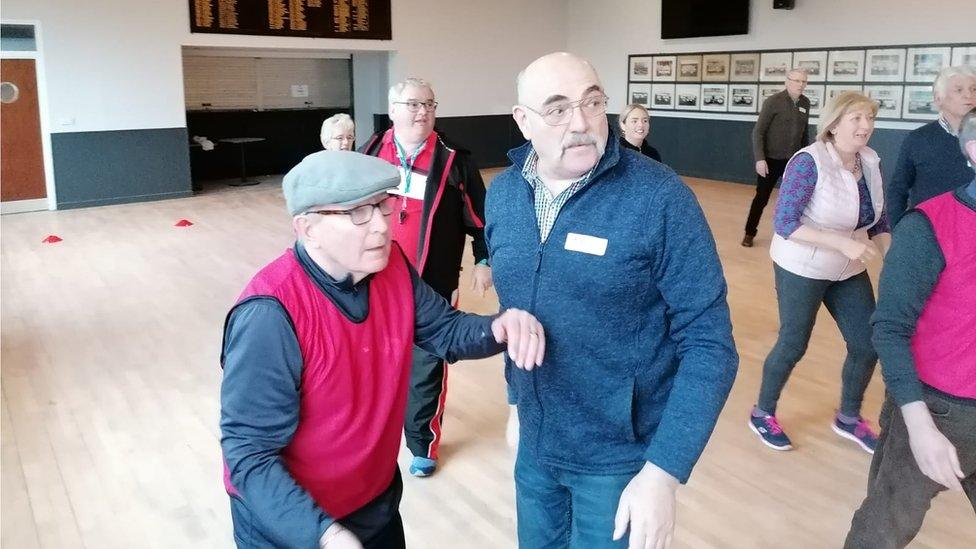
Norman Buchanan (left) said the social aspect of sport is important to him
Every sports fan will cherish memories of the great triumphs and dramas in following their team.
Perhaps it was the time they won the cup, the iconic player who inspired their youth, or the adrenaline of a last minute point or goal that clinched victory or survival.
For people who live with dementia and their relatives, these recollections can be invaluable.
As the condition causes memory to fade, sport is an evocative and nostalgia-filled subject that can tap into a positive moment in time.
Norman Buchanan, 71, is a lifelong Manchester United fan and is involved with Dunmurry Young Men FC.
A former player, known as Stormin' Norman, he said it was important that he got back to his weekly routine after the disruption caused by the Covid-19 pandemic.
"I look forward to it every week. That year-and-a half off has been bad, very bad. We're back to square one."
However, come rain or shine, "I'll be there for the next match", he said.
'You need the craic'
Norman described how the "social side of things is very important" in attending sport, and club members would ask for his memories about old photographs of players and teams.
"I don't know what I would do without the football. It's great mixing with new members, telling them old stories," he said.
One story he shared with BBC News NI was his vivid recollection of watching his "hero", the late George Best, play against Scotland in 1967.
"The greatest display I've ever seen," he remarked. "George Best is number one for me."
Best, who died in 2005, was part of 'The Holy Trinity' at Manchester United, which also featured Sir Bobby Charlton and Denis Law.
In the past year, the families of both Charlton and Law have released statements revealing that both men are living with dementia.
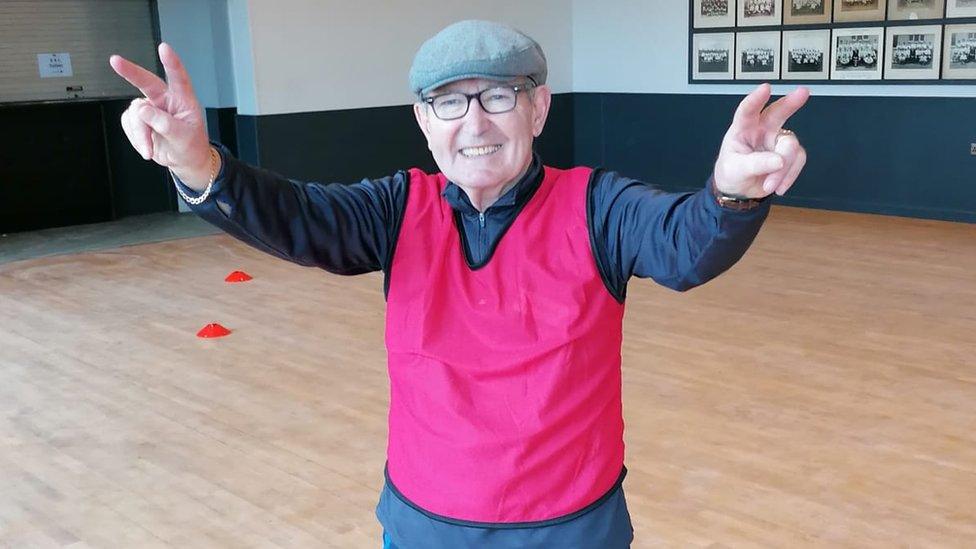
Norman recently took part in a Walking Rugby event organised by Dementia NI and Ulster Rugby
Norman recently took part in a Walking Rugby project, which was organised by Ulster Rugby and Dementia NI.
He said he wanted to "keep involved, seeing and meeting new friends".
"The craic's good, you need the craic," he added.
Gerard Doran, 62, said people "could not believe it" when he told them he had dementia: "They said 'sure you're not old'."
From the age of 12 he has played for, managed and supported St Peter's GAA club in Lurgan, County Armagh.
His nickname in his playing days was the Animal.
"I was a bit rough, let's say," he joked.
Gerard Doran said GAA and hillwalking have helped him live with dementia
"Sport is quite incredible to me, in terms of friendship, in terms of feelings, in terms of achievement and it's not just physical, the mental abilities and the mental benefits are quite incredible," Gerard continued.
"Meeting my friends and talking about all those times, all those years, is still a very important part of my life."
Gerard is also a keen hill walker and is looking forward to a future adventure climbing Ben Nevis in Scotland to raise money for charity.
He said the past year without sport "wasn't existing" and had "knocked me down quite a bit".
With the return of crowds, he said clubs should do more to help fans living with dementia.
"They concentrate on who's playing and sometimes they forget there are a lot of over-60s who want to be part of it," he said.
"Clubs really should be thinking about how the reminiscence I am now getting is part of my gains. Older people are still part of their clubs and maybe need a bit of support, getting there and being able to talk to people."
'Reignite positive memories'
In June, Shelbourne FC in Dublin organised an event for fans living with dementia, inviting the ex-Celtic and Republic of Ireland goalkeeper Packie Bonner to talk about his 1990 and 1994 World Cup memories.
The plan, as Bonner told BBC News NI, was "to reignite positive memories".
It was a personal interest too, as his mother and mother-in-law had dementia.
"Sport is one of these very, very emotional things," the County Donegal man explained.
"Whether it's Gaelic football, whether it's soccer or other sports, if there's something in that space which can help people make their memories enjoyable and trigger something, it's a brilliant idea.
"It's terrible to see somebody who is so active, so bright and so good at socialising with people go to a position where they can't do that anymore."
Shelbourne has announced that the event is to become a regular fixture.
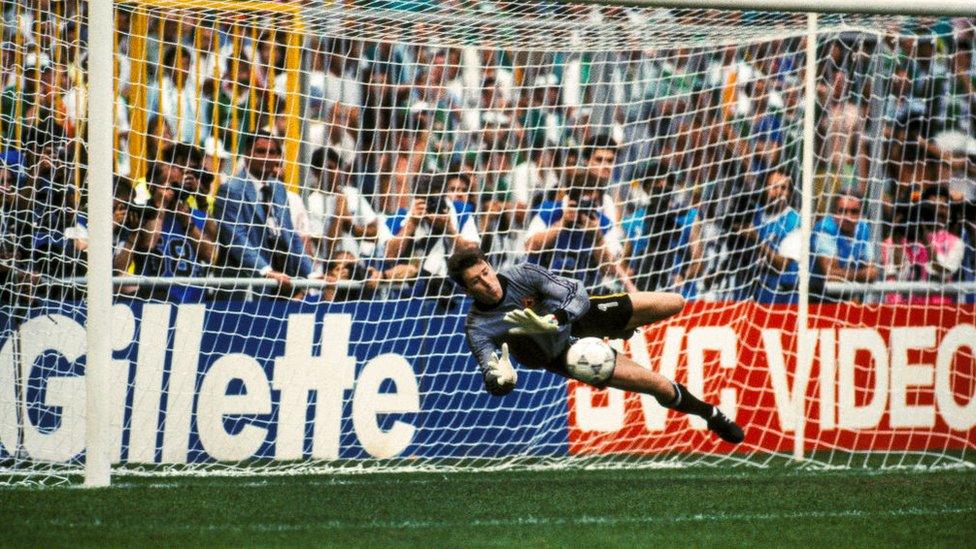
Packie Bonner, pictured saving a penalty in the 1990 World Cup, reminisced with fans about his career
Linfield FC in Belfast have plans for another programme, to be spread over nine weeks, with the aim of supporting Irish League fans and their families.
Linfield board member Stephen Shaw explained that it will involve tours of Windsor Park, reminiscing through old photos of Belfast, trips to local museums and music, as well as advice from health professionals.
The Covid-19 pandemic has delayed the scheme, but it is hoped to be launched in the coming months.
Mr Shaw said the club "wanted to be proactive in reaching out to the community" and "to do something positive".
"We want it to have an impact. It was fans and ex-players who challenged me to do something," he said.
He also said the club would be open to ideas for how to better support fans who have dementia coming to matches.
'Open book of opportunity'
Ashleigh Davis, an empowerment officer at Dementia NI, said its members wanted to keep active "despite their diagnosis".
She urged sports clubs to "make small changes" to help people.
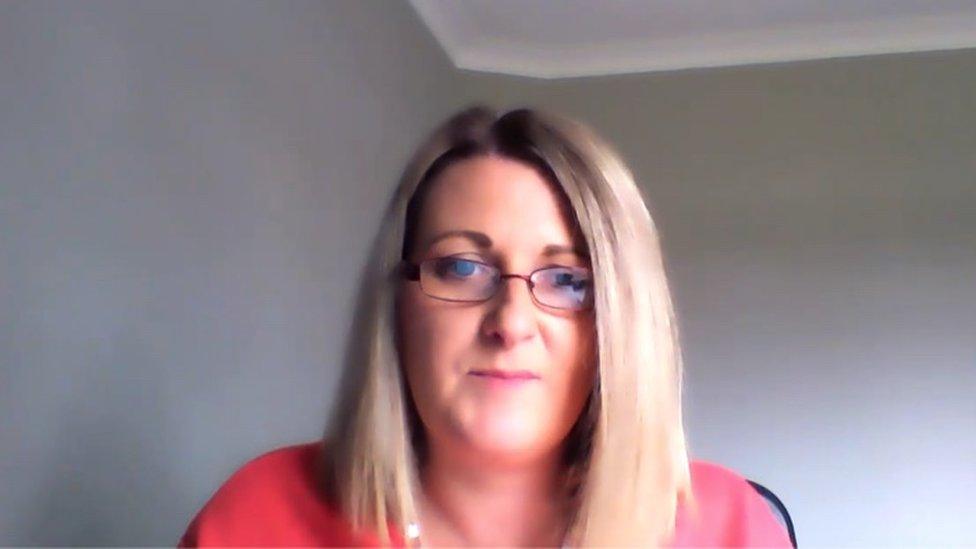
Ashleigh Davis from Dementia NI said clubs could make small changes to be dementia-friendly
"We would ask the clubs to consider making their areas more accessible and consider the needs of people with dementia," she explained.
"These don't need to be costly measures, they can be very simple such as the type of signage they use, making a quiet area available and just ensuring there are a few people on hand to assist if necessary."
Bernadine McCrory, director of the Alzheimer's Society in Northern Ireland, said clubs and organisations should be mindful of people with dementia, particularly as fans begin to return to live events.
"If you have someone in your club and you know they have dementia and they want to be there, get a volunteer to do things with them," she said.
"Maybe go into the ground before games, get a cup of tea, get their seat, but also do something like walking around the pitch."
Ms McCrory said fans with dementia can have a "purpose at the club" to "relay stories" and record the history of Northern Ireland sport.
"It is an open book of opportunity. Sporting events are really important to people and they are quite often milestones in their lives," she said.
"People can generally remember the date and the year and there's a sense of comradeship.
"People with dementia and many others will tell us it's not what you tell them or what you do for them, it's what they feel that matters."
Information and support about dementia can be found at the BBC Action Line website.
Related topics
- Published23 May 2021
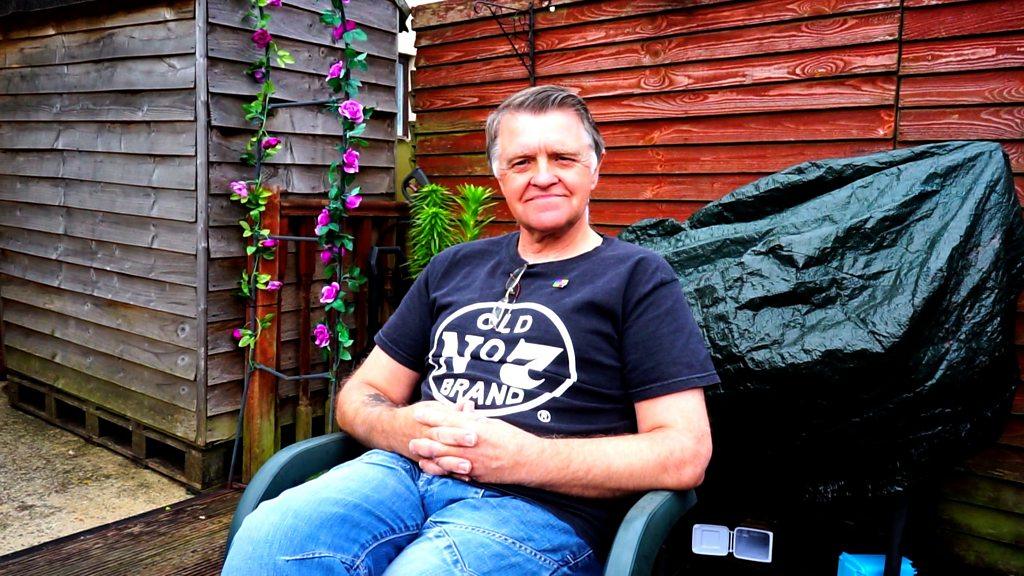
- Published2 May 2020
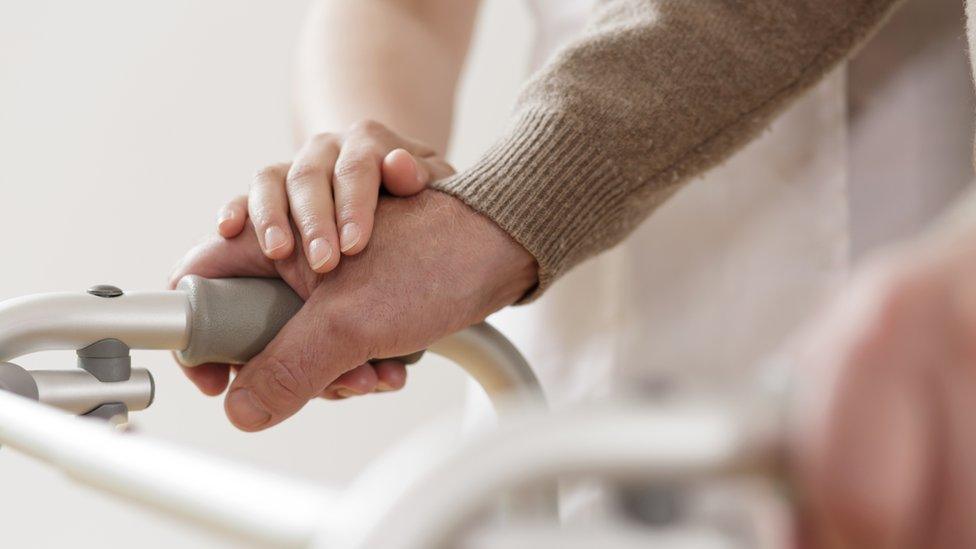
- Attribution
- Published19 August 2021

- Attribution
- Published1 November 2020
